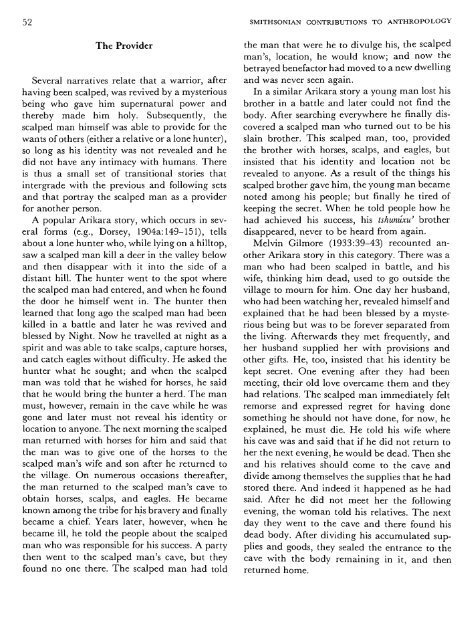Plains Indian Studies - Smithsonian Institution Libraries
Plains Indian Studies - Smithsonian Institution Libraries
Plains Indian Studies - Smithsonian Institution Libraries
You also want an ePaper? Increase the reach of your titles
YUMPU automatically turns print PDFs into web optimized ePapers that Google loves.
52 SMITHSONIAN CONTRIBUTIONS TO ANTHROPOLOGY<br />
The Provider<br />
Several narratives relate that a warrior, after<br />
having been scalped, was revived by a mysterious<br />
being who gave him supernatural power and<br />
thereby made him holy. Subsequently, the<br />
scalped man himself was able to provide for the<br />
wants of others (either a relative or a lone hunter),<br />
so long as his identity was not revealed and he<br />
did not have any intimacy with humans. There<br />
is thus a small set of transitional stories that<br />
intergrade with the previous and following sets<br />
and that portray the scalped man as a provider<br />
for another person.<br />
A popular Arikara story, which occurs in several<br />
forms (e.g., Dorsey, 1904a: 149-151), tells<br />
about a lone hunter who, while lying on a hilltop,<br />
saw a scalped man kill a deer in the valley below<br />
and then disappear with it into the side of a<br />
distant hill. The hunter went to the spot where<br />
the scalped man had entered, and when he found<br />
the door he himself went in. The hunter then<br />
learned that long ago the scalped man had been<br />
killed in a battle and later he was revived and<br />
blessed by Night. Now he travelled at night as a<br />
spirit and was able to take scalps, capture horses,<br />
and catch eagles without difficulty. He asked the<br />
hunter what he sought; and when the scalped<br />
man was told that he wished for horses, he said<br />
that he would bring the hunter a herd. The man<br />
must, however, remain in the cave while he was<br />
gone and later must not reveal his identity or<br />
location to anyone. The next morning the scalped<br />
man returned with horses for him and said that<br />
the man was to give one of the horses to the<br />
scalped man's wife and son after he returned to<br />
the village. On numerous occasions thereafter,<br />
the man returned to the scalped man's cave to<br />
obtain horses, scalps, and eagles. He became<br />
known among the tribe for his bravery and finally<br />
became a chief Years later, however, when he<br />
became ill, he told the people about the scalped<br />
man who was responsible for his success. A party<br />
then went to the scalped man's cave, but they<br />
found no one there. The scalped man had told<br />
the man that were he to divulge his, the scalped<br />
man's, location, he would know; and now the<br />
betrayed benefactor had moved to a new dwelling<br />
and was never seen again.<br />
In a similar Arikara story a young man lost his<br />
brother in a battle and later could not find the<br />
body. After searching everywhere he finally discovered<br />
a scalped man who turned out to be his<br />
slain brother. This scalped man, too, provided<br />
the brother with horses, scalps, and eagles, but<br />
insisted that his identity and location not be<br />
revealed to anyone. As a result of the things his<br />
scalped brother gave him, the young man became<br />
noted among his people; but finally he tired of<br />
keeping the secret. When he told people how he<br />
had achieved his success, his tshunuxu' brother<br />
disappeared, never to be heard from again.<br />
Melvin Gilmore (1933:39-43) recounted another<br />
Arikara story in this category. There was a<br />
man who had been scalped in battle, and his<br />
wife, thinking him dead, used to go outside the<br />
village to mourn for him. One day her husband,<br />
who had been watching her, revealed himself and<br />
explained that he had been blessed by a mysterious<br />
being but was to be forever separated from<br />
the living. Afterwards they met frequently, and<br />
her husband supplied her with provisions and<br />
other gifts. He, too, insisted that his identity be<br />
kept secret. One evening after they had been<br />
meeting, their old love overcame them and they<br />
had relations. The scalped man immediately felt<br />
remorse and expressed regret for having done<br />
something he should not have done, for now, he<br />
explained, he must die. He told his wife where<br />
his cave was and said that if he did not return to<br />
her the next evening, he would be dead. Then she<br />
and his relatives should come to the cave and<br />
divide among themselves the supplies that he had<br />
stored there. And indeed it happened as he had<br />
said. After he did not meet her the following<br />
evening, the woman told his relatives. The next<br />
day they went to the cave and there found his<br />
dead body. After dividing his accumulated supplies<br />
and goods, they sealed the entrance to the<br />
cave with the body remaining in it, and then<br />
returned home.

















